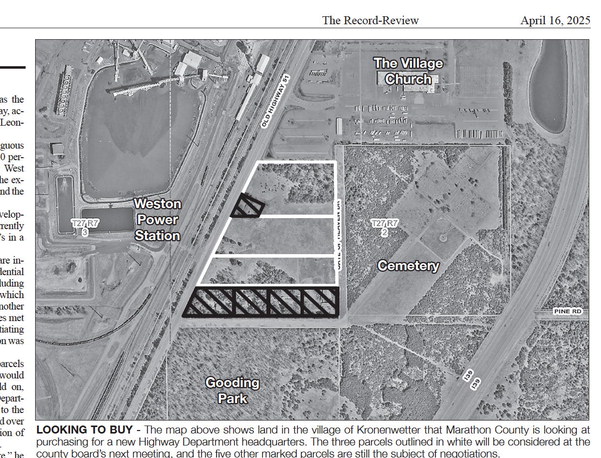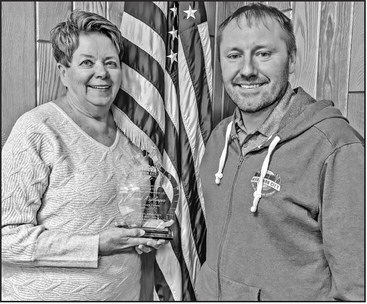ERC gives initial OK for digester


By Kevin O’Brien
Hoping to gain some leverage over water usage and groundwater protection, members of Marathon County’s Environmental Resources Committee (ERC) are urging the county to move forward with negotiating a $40 billion bond for a company that wants to build a manure digester at a large dairy farm in the village of Maine.
After hearing from three Wisconsin DNR representatives, the committee voted Tuesday to recommend approval of an initial resolution that could pave the way for the county to serve as a conduit borrower for Macquarie Capital, which is seeking tax-exempt bonding to build a bioenergy facility at Van Der Geest Farm.
The ERC is one of three standing committees reviewing the bonding proposal, which will only move forward if the
See COW MANURE/ page 13 Cow manure
Continued from page 1
full county board adopts an initial resolution later this month. Once an initial resolution is adopted, county officials would enter into negotiations with the developer over a potential issuer’s fee and other terms. A final resolution would be required to issue the bonds.
ERC chairman Jacob Langenhahn said approving the initial resolution will also give the county an opportunity to address environmental issues related to the operation of the proposed digester. Otherwise, he said the county will have little or no say regarding those topics.
County conservationist Kirstie Heidenreich said it may be a good idea, for example, for the county to ask for monitoring wells to be installed around the facility, which will be built into the ground and potentially pose a risk to groundwater.
“If you are the conduit, you could ask them to go above and beyond what is required,” she told committee members.
Mark Kaczorowski, a DNR specialist who issues permits to Concentrated Animal Feeding Operations (CAFOs) in Marathon County, said it’s unlikely that monitoring wells would be installed at the site if not mandated. The plans and specs of proposed manure digesters are subject to DNR review, but a separate permit is not required for one to be built, he said.
“It’s pretty much relying on sound engineering to ensure that there aren’t leaks,” he said.
Groundwater availability also falls under the DNR’s purview.
Adam Freihoefer, chief of the DNR’s water use section, said groundwater scarcity is an ongoing concern in much of Marathon County, especially when it comes to issuing permits for high-capacity wells at large agricultural operations. He noted that Van Der Geest currently has 18 such wells, and it’s allowed to pump up to 12 million gallons of water in a 30-day period. Normally, the dairy only uses about a third of its capacity, but during drier periods, it utilizes as much as 50 to 60 percent of its allowable limit, he said.
If a CAFO like Van Der Geest pumps too much water at once, Freihoefer said it could drain a neighboring well, and because of the difficult geology in this part of Wisconsin, the aquifer won’t always replenish itself right away.
“If you dry up a well, there’s not a quick remedy. You’re trucking water at that point,” he said. “That’s both an environmental and a political situation that nobody really wants.”
Bernie Michaud, a CAFO review engineer at the DNR office in Madison, said manure digesters themselves are not known to increase water usage, but Van Der Geest is also planning to expand its herd in conjunction with the project, so additional water will be needed for watering and cooling the cows.
When a CAFO is planning a herd expansion, Heidenreich noted that water usage is not a factor in the DNR’s approval process, as long as the farm has adequate manure storage capacity and enough land to spread waste.
Marilyn Bhend of the Wisconsin Towns Association asked if Van Der Geest would realistically be able to add more highcapacity wells – without harming the local water table – if it increases its herd size. Freihoefer said “that’s the milliondollar question” for all large dairies in western Marathon County. “We’re not saying you can’t expand,” he said. “We’re saying you need to think about the water upfront. It can’t be an afterthought.”
The DNR has not yet received plans and specs from Van Der Geest for the proposed manure digester.
Langenhahn said he was “apprehensive” about taking a stance on the proposal without knowing more about water usage and other issues, but he said the county can always reach out to the developer and ask for more details.
If the county decides not to serve as a conduit borrower, Macqaurie can also seek tax-exempt bonds from the Wisconsin Public Financing Authority – as long as the county and the village of Maine grant their consent.
“Even if we don’t support it, they’re probably going to do it anyway,” Langenhahn said.
Ultimately, committee members decided that the county could potentially have more control over the digester project by adopting an initial resolution, which will also give the board more time to develop formal criteria for other bonding proposals.
“The county does need to have a policy in place for how we treat these requests,” Langenhahn said.
Jacob Langenhahn




